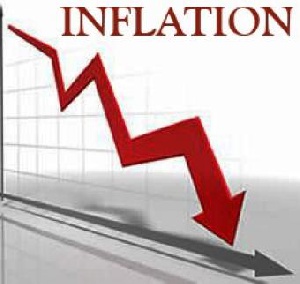Consumer price index (CPI) inflation fell in August for the first time since the Ghana Statistical Service (GSS) updated its basket for computing the index.
The rate declined to 11.5 percent from 11.8 percent in July, giving the Bank of Ghana (BoG) room to hold its key lending rate at 16 percent when the monetary-policy committee meets later this month.
Monthly inflation fell by 0.7 percent after rising by 1.3 percent in August. The BoG has said it expects annual inflation to end the year within the upper band of its 7-11 percent target.
Food inflation, including prices of non-alcoholic beverages, inched up surprisingly to 7.9 percent during the month from 7.3 percent in July -- defying expectations of easing which is typical of the July-September harvest season.
Non-food inflation, which includes items such as clothing, footwear and transport prices, slipped to 14.2 percent from 15.4 percent, said Baah Wadieh, acting Deputy Government Statistician, at a press briefing in Accra on Wednesday.
The BoG, which has increased its policy rate by 100 basis points this year to rein-in price pressures from the large budget and current account deficits, may begin to see its policies succeeding in controlling inflation despite lingering fiscal problems.
At the bank’s last policy meeting in July -- which came shortly after government had sold a US$1billion Eurobond on the international market -- Governor Henry Kofi Wampah described the Central Bank’s policy settings as appropriate given the prospects and risks for growth and inflation.
Dr. Wampah’s confidence has since been boosted following a jump in the bank’s reserves from less than US$5billion to US$5.8billion, providing a more robust cushion to support the cedi -- which has lost more than 20 percent against the dollar since the beginning of last year.
Inflows from the Eurobond helped increase the reserves to the present level, and additional inflows from Cocobod’s international loan will raise the buffers to US$6billion by year-end, said Adams Nyinaku in an interview with the B&FT last week. The expected reserves will exceed the BoG’s target of more than three months of import cover, he added.
The cedi, too, will be stable, Mr. Nyinaku said, adding that he “completely disagrees” with some analysts’ forecasts that it will see relatively substantial depreciation in the final months of the year. The currency has lost more than 6 percent in 2013, but the monthly rate of fall has slowed since the first quarter of the year.
Business News of Friday, 13 September 2013
Source: B&FT

















